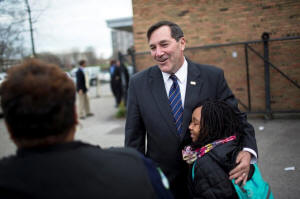|
'Mini-Trump' candidates battle it out in
Republican primaries
 Send a link to a friend
Send a link to a friend
 [May 07, 2018]
By James Oliphant [May 07, 2018]
By James Oliphant
INDIANAPOLIS, Indiana (Reuters) - Mike
Braun, an Indiana businessman turned politician, rails against
Washington, says he speaks for disaffected voters, and uses his personal
wealth to help finance his bid for public office.
Any similarity to President Donald Trump is entirely intentional.
Braun, who owns a distribution and freight company, says he would not
have launched his Republican effort for the U.S. Senate if Trump had not
blazed the trail two years ago.
“I thought there was the opportunity to define a different kind of
candidacy, one from the outsider business world, the same thing Trump
did,” he told Reuters ahead of the primary vote on Tuesday.
Other Republican primary races in Ohio and West Virginia on Tuesday also
feature outsider businessmen who have gone all out to show their
allegiance to Trump and accuse their rivals of lacking the same fealty.
The three contests herald a wave of primaries in the coming weeks in
critical states such as Pennsylvania, California, Iowa, and New Jersey
that will help determine whether Democrats can pick up two seats in the
Senate and 23 seats in the House of Representatives in November to take
control of Congress.

The candidates also highlight a shift in the Republican Party to embrace
more populist, nativist and protectionist candidates skeptical of
immigration and free trade – a seismic change from the party’s
traditional alliance of social conservatives and free-marketeers.
How those Trump-like candidates fare in coming primaries and November’s
elections will indicate whether “Trumpism” remains a dominant force in
the Republican Party heading into the 2020 presidential election.
Republican leaders are nervously watching the West Virginia primary
where former coal executive Don Blankenship has centered his candidacy
around attacking Senate Majority Leader Mitch McConnell.
Blankenship accuses McConnell of undermining Trump and has run TV ads
highlighting McConnell’s wife’s Taiwanese heritage, drawing widespread
condemnation.
Blankenship served time in prison for safety violations connected to a
2010 disaster that killed 29 miners, and is viewed as the weakest choice
to take on Democratic Senator Joe Manchin.
The other candidates in the race are U.S. Representative Evan Jenkins
and state Attorney General Patrick Morrisey.
In Ohio, businessman Mike Gibbons is squaring off against U.S.
Representative Jim Renacci to see who will challenge Democratic Senator
Sherrod Brown in November. While Gibbons has played the Trump card,
however, Renacci snagged the president's endorsement.
To show how much he supports Trump, Gibbons, an investment banker, on
Friday filed a defamation lawsuit against Renacci, alleging his campaign
falsely claimed Gibbons is anti-Trump.
HOT RACE
Indiana is home to perhaps the bitterest Republican primary in the
country, with all three candidates scrambling to show voters their Trump
bona fides and face incumbent Democratic Senator Joe Donnelly in the
November election.

Braun portrays himself as cut from Trump's cloth and U.S. Representative
Todd Rokita carries a cardboard likeness of Trump to campaign events and
wears a cap adorned with Trump’s campaign slogan "Make America Great
Again" in TV ads.
[to top of second column]
|

U.S. Rep. Joe Donnelly (D-IN) campaigns at a polling place in
Indianapolis, Indiana, November 6, 2012. REUTERS/Aaron P.
Bernstein/File Photo

Last week, Rokita sponsored a resolution in the House demanding that
Special Counsel Robert Mueller end his investigation unless he can
show evidence that Trump's campaign colluded with Russia to
influence the 2016 election.
And the third candidate, U.S. Representative Luke Messer, nominated
Trump for the Nobel Peace Prize for his role in the talks between
North and South Korea.
“This is just the start of what President Trump can accomplish if he
has the leaders that support him in Washington,” Messer told Reuters
after a campaign event in Carmel, Indiana.
Braun’s campaign has labeled Messer and Rokita “swamp creatures” for
the 12 years combined they have spent in the House. Trump often
promises supporters he will “drain the swamp” in Washington,
referring to career politicians and lobbyists.
Kyle Kondik, an analyst at the Center for Politics at the University
of Virginia, said Messer and Rokita "are going out of their way to
be pro-Trump in almost cartoonish fashion ... It's kind of
shameless.”
He said Republican voters likely will respond well to Braun’s lack
of political experience but it is unclear whether he would be the
best candidate to defeat Donnelly, considered to be among the most
vulnerable Democrats in the nation.
Donnelly won his first term in 2012, when Democrats swarmed to the
polls to re-elect President Barack Obama. He faces a far tougher
challenge after Trump won Indiana by 19 percentage points in 2016.

Messer says Braun is flawed, pointing to his history of voting in
Democratic primaries and suggesting he is not a reliable
conservative.
Braun says he voted in Democratic primaries in the past because in
his southern Indiana home Democrats held all the local offices.
He positions himself as in sync with the conservative Tea Party
movement and has poured about $5.4 million of his own money in the
race, according to federal records. Trump spent about $65 million of
his own funds during his campaign.
Kondik said that Braun, as an unknown quantity, carries the most
risk for his party against Donnelly, but he might also be able to
bring in independents turned off by the other two conservatives.
“He has the most variance between risk and reward," he said.
(Reporting by James Oliphant; Editing by Kieran Murray and Lisa
Shumaker)
[© 2018 Thomson Reuters. All rights
reserved.]
Copyright 2018 Reuters. All rights reserved. This material may not be published,
broadcast, rewritten or redistributed.
Thompson Reuters is solely responsible for this content. |